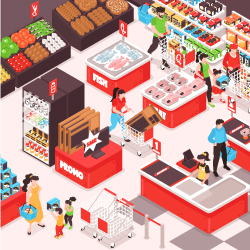Have you ever been annoyed when retailers start playing Christmas music in October? Or roll your eyes when a store pulls out Valentine's Day products long before February 14th? Maybe you’re surprised that Easter is almost here because you begin seeing chocolate eggs and pictures of bunnies in-store. There is a good reason why all of this happens. And no, it’s not to make retailers more money.
Of course, retailers want to make money. We’re not shying away from that fact. It’s one of their reasons for being in business, and you can’t begrudge them that. But there is another reason why retailers bring out these seasonal products long before the season actually begins.
Retailers want to please you, the shopper. They want you to enjoy shopping at their store so much that you'll want to do it again and tell your friends and family to shop with them too.
So how can they do that? How do retailers use seasonal events and products to provide a better shopping experience? In this article, we take a look at the why behind the November Christmas music, the reason behind the mounds of Easter eggs and the tactics that go into tweaking the pricing on your favourite sunscreen in the run-up to summer.

1. Retailers use seasonal products to cater to your needs
We need to confess something. Maybe you know it. Maybe you don’t. But here it is:
As a customer, you call the shots. You can choose to shop at one store over another, effectively having a significant influence in the success of any retail store.
It’s reality. Lindsay Peacock, writing for Shopify agrees too. We live in the era of the empowered customer. And retailers know that. It’s why you’ll see continued advertisements across old and new media channels, inviting you to shop at their stores.
It's also one of the factors that drive their assortment planning decisions - those decisions made around what they need to stock in-store to meet your needs.
It’s the same when it comes to seasonal products.
The goal is to provide you with the items you and your fellow shoppers need before you even realise that you want or need them. Yes, you might have to suffer through Boney M repeats a day after Halloween. We’re sorry about that! Or be flooded with flowers, chocolates and fluffy toys on shelves that previously held other products. Not so sorry when you’ve forgotten to book the restaurant now, are we?
Though no one likes not finding items where they expect them to be, it can be worth the pain, especially considering that seasonal products often only run for a limited time during the year.
But it’s all for the purpose of catering to you and your needs.
Retailers want you to shop at their stores, and they will do everything in their power to convince you to do that. Of course, persuading you to shop with them is only half of it. The other half includes having all the items you need so that you won’t need to go elsewhere to shop.
So the next time you visit a store and notice the tell-tale sign of seasonal decorations - remember this: it’s because the store wants to show you what they can and do to cater to your specific needs.

2. Seasonal products help retailers to foster customer loyalty
What keeps you coming back to your favourite store every day? Is it convenience, location, price - or is it something else altogether? Retailers see customer loyalty as a precious commodity. They’re always trying to convince you that what they have to offer is far superior to their competition and that by visiting their stores you’re getting more bang for your buck.
But how do they convince you to keep coming back? They appeal to your needs better than the other guy. And what better way to do this than with seasonal products!
It’s no secret that Christmas cake costs more in December; candy prices skyrocket right before Halloween, and Easter eggs can break the bank when the guy in the bunny suit appears well before mid-April. This is called demand pricing, and retailers often don’t have a choice in having to match their suppliers’ price surges.
But when one retailer decides to keep prices on a particular seasonal product - let’s say, sunscreen in the summertime - lower than their competition, they’re on the hunt for some of that customer loyalty you have to offer.
Without even knowing it, your brain is already making a note of the fact that this retailer is offering a little more value than the others and before you realize what’s happening, you’ll be coming back.
Okay, there’s a little more to driving customer loyalty than through seasonal products only, but they’re still a great tool to keep people invested in a particular retailer.

3. Retailers use seasonal products to set the right mood
The effort that retailers make in showcasing their commitment to their seasonal products speaks volumes about their commitment to improving your shopping experience. Why? Because as much as 84% of companies that work to improve their shopper experience report an increase in revenue.
So, while it may bug you that you’re going to have to endure Christmas lights, and holiday carols for at least the length of December, the kids are far more likely to drag you into a store with a Santa in the doorway than one who has a frazzled Christmas tree with no lights - and retailers know this.
There’s a method behind the tactics though.
Retailers aren’t simply trying to take advantage of the seasonal period. They’re attempting to uplift your shopping experience too.
While you might not pay much attention to the decorations, posters and part-time costumed promoters walking around, they’re there for a reason. They’re there to get you in the mood.
Without even knowing it, you’re already getting into the swing of things, with music, visually appealing props and strategically placed complementary products all adding to the seasonal vibe in the store.
Think of the last time you shopped while in a good mood. You probably spent a little more than you thought you would, right? Well, you are far more likely to grab additional basket items when you’re tapping your foot to your favourite holiday tune than when you’re in a terrible mood.

4. Seasonal products allow retailers to provide promotional items
Seasonal products were made to be promoted. Nobody’s going to buy a scarf in mid-summer, but they’re prepared to pay a premium for the woolly garment in the wintertime. And who's interested in candy canes in March? Nobody.
But the magic of skilful promotion means that you’re mysteriously OK with shelling out the big bucks for a standard scarf when that late-autumn chill blows in, and the kids will love you when you roll up the drive with an armful of 2-for-1 discounted red and white rock candy. You know we’re right. We can picture your head nodding and that wry smile of yours.
You see, retailers are pitching their promotional offers long before you get to the store itself. And when it comes to promoting seasonal products, you’re already primed to either buy because you need them or to save a bundle out-of-season.
From emails to texts, online ads to newspaper coupons, promotions pave the way to the store. But it’s not to trick you into buying something at a premium or when you don’t need to. Instead, it gives you the option to choose for yourself. This helps you stock up ahead of the seasonal rush, or to save when you’re on the verge of breaking the budget.
So the next time you’re clearing out your spam folder, maybe pay a little more attention to those promotional retail emails - you may just get lucky.

5. Retailers use seasonal products to increase foot traffic
By now, you should have a better idea of why retailers use seasonal products. We’ve touched on the point that it can help to foster increased loyalty for you - they know it must be sincere and heartfelt for you to accept it.
We’ve also written about the improvement of the shopping experience and how it can lead to better deals for you (promotions and pricing). These are all points that focus on you, the shopper.
This last point around increasing foot traffic in-store appears to be different. It appears to focus on what the retailer gets from stocking seasonal products. From one angle, we’d agree. it does appear that way. However, we’d like to turn that around and explain why it’s also shopper-focused. Or, in this case, ‘you-focused’.
The more people that visit a retailer’s store, the more they know that what they’re offering (products and the experience) meets the needs of shoppers. It’s a gauge of whether or not they are able to please you ahead of Christmas, Spring break, Ramadan, Mother’s Day, Diwali and or any other seasonal event.
If they notice that foot traffic is low, they know that they have to look at the products they have on offer. They might even need to re-evaluate how they’ve laid out their store and what they can do to improve.
Of course, there could be other factors, but product assortment is the “single most important factor affecting foot traffic”. It’s a point made by Retail Refined’s Melissa Gonzalez who interviewed Karen Bomber, the Vice President of Global Marketing for Honeywell at NRF 2022. Bomber also believes shoppers are pushing the industry forward.
This comes back to that point we made at the beginning of this article.
As a shopper, you have the power. You can decide if a retail store stays in business or not.
In such an instance, why would a retailer not want to cater to you, be that through seasonal products or regular products throughout the year? The short answer is that they wouldn’t ever.
Conclusion
Retailers have two reasons for being in business. The first is to make sales and a profit. The second is to provide you, the shopper with the products and experience that will have you returning.
Both are certainly connected. You could expect a retailer to make a profit without you first buying their products. That’s where seasonal (and other) items play a role. If they can provide you with the products you want, all year round, you both win.
Need further evidence that it’s not you who needs the retailer but the retailer who needs you? Next time you visit a store and leave unhappy, remember that it's not you who ultimately loses, it's the store. Because you never need to visit that store and - you can find another store that caters to your needs. And retailers know that.


